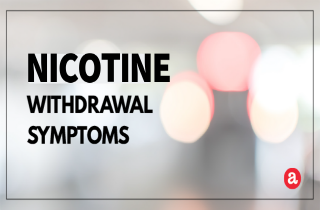Smokers can and do quit smoking. So do people who chew tobacco. So when you want to quit using products with nicotine…what can you expect? Are there any side effects of nicotine withdrawal?
We review the most common symptoms of nicotine withdrawal here, and refer you to a nicotine withdrawal timeline, side effects of nicotine withdrawal and nicotine withdrawal remedies. We invite your questions, comments and feedback at the end.
What is nicotine withdrawal?
Nicotine is the main psychoactive, addictive substance in cigarettes and other forms of tobacco. Nicotine is a drug that affects many parts of your body, including your brain. How is nicotine an addictive drug? By delivering consistent doses of the chemical nicotine to your bloodstream and brain. Over time, your body and brain get used to having nicotine in it. And when you stop smoking or chewing tobacco, your body has to adjust to the absence of nicotine. So, nicotine withdrawal is a state characterized by symptoms that appear as your body gets back into homeostasis and adjusts to not having nicotine anymore.
The more nicotine, the harder the withdrawal
In general, symptoms of nicotine withdrawal are related to frequency and intensity of use. In other words, you are more likely to experience more nicotine withdrawal symptoms more intensely the more exposed to nicotine you are. And, yes. Nicotine added to tobacco will increase your exposure and addiction liability.
However, not everyone experiences feelings of symptoms related to nicotine withdrawal. You may have one or many symptoms of withdrawal present. And they may last different amounts of time. Every person is different and your case may not conform to typical withdrawal.
Is nicotine withdrawal safe?
Yes. Sometimes nicotine withdrawal can be extremely uncomfortable. But rest assured that there is no health danger from nicotine withdrawal. In fact, quitting nicotine products is one of the best things you can do for your health. Even the most extreme withdrawal symptoms generally fade after a week.
Common nicotine withdrawal symptoms
Common withdrawal symptoms associated with quitting products that contain nicotine include:
- anger
- anxiety
- depression
- difficulty concentrating
- difficulty sleeping
- dizziness
- feeling jumpy
- feeling more hungry more often (increased appetite)
- feeling sad, blue or depressed
- frustration
- headache
- increased dreaming
- irritability
- nicotine cravings (strong need or urge to smoke/chew)
- restlessness
- slower heart rate
- weight gain
Some people do experience increased sadness after quitting smoking. This is especially important to watch for if you have ever had depression. If you do become depressed and are having extreme sadness, you should get help
How long does nicotine withdrawal last?
Nicotine withdrawal symptoms are usually most intense and uncomfortable during the first week after quitting. After that, the intensity of the symptoms drops slowly over the first month and symptoms are usually non-existent within a few months after nicotine cessation.
Why do I still crave nicotine?
Frequently, craving nicotine lasts longer than the other symptoms of withdrawal. This is because our brains associate nicotine consumption with pleasant feelings, or “euphoric recall”. Therefore, many places and things can trigger a craving because it reminds you of the nicotine high. The persistence of mental nicotine cravings makes it crucial that you have a relapse prevention plan to that you know how to handle cravings. Over time, as nicotine is no longer a part of your life, triggers will no longer remind you of smoking and the mental obsession for nicotine will subside.
Questions about nicotine withdrawal symptoms
Are you going through nicotine withdrawal right now? Want to share about what’s going on? Please leave your questions and comments below. We respond to all legitimate queries with a personal and prompt reply.
Reference sources: Smoke Free [dot] gov info on Withdrawal
National Cancer Institute: How To Handle Withdrawal Symptoms and Triggers When You Decide To Quit Smoking
CDC report on Tobacco Use and Symptoms of Nicotine Withdrawal Among Adolescent and Young Adult Tobacco Users
CDC Smoking Cessation Tips









Related Posts